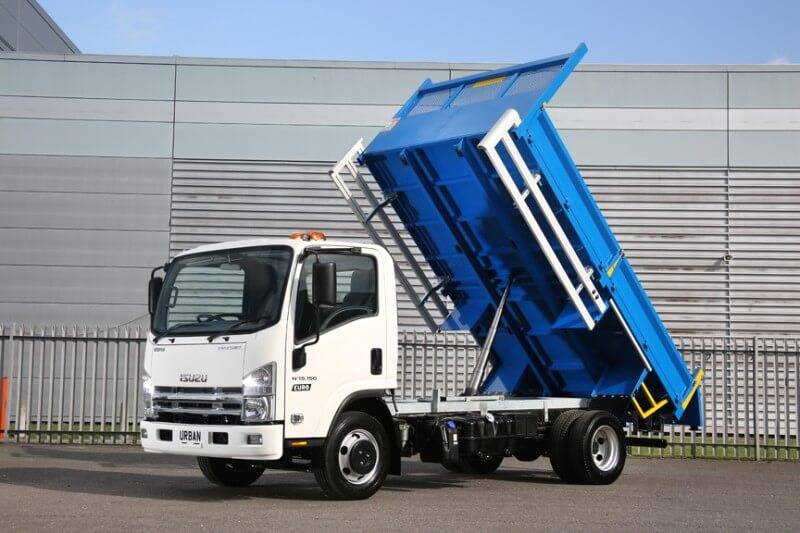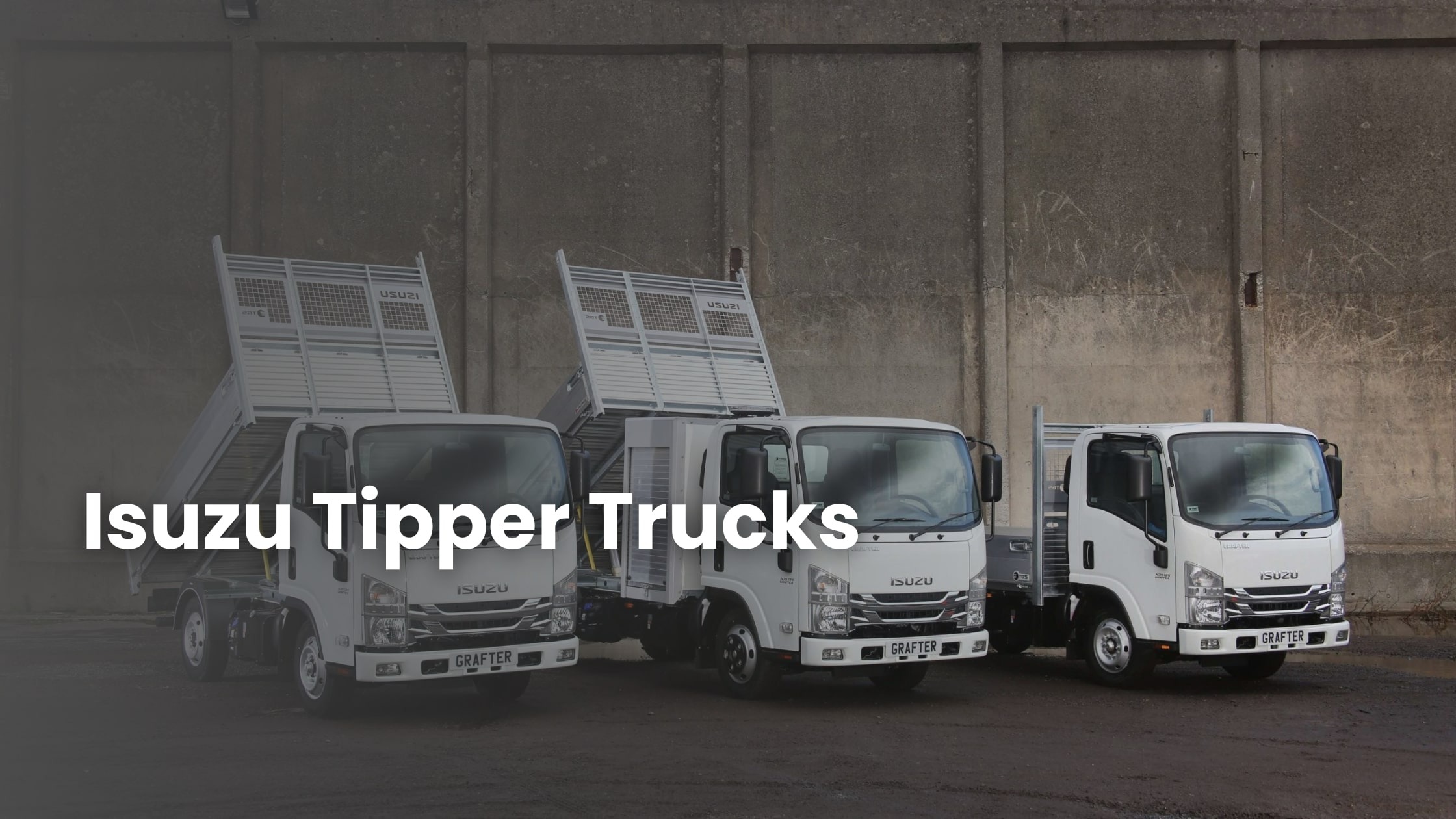Benefits of Isuzu Tipper Trucks
In today's fast-paced industries, the need for efficient material handling and transportation is paramount. Tipper trucks have emerged as versatile vehicles that play a crucial role in various sectors, from construction and mining to waste management. With their unique design and specialised features, tipper trucks offer a convenient solution for transporting bulk materials. In this article, we will delve into the world of tipper trucks, exploring their purpose, applications, features, benefits, and future trends.
Material handling forms a fundamental aspect of industries that deal with bulk goods. Whether it's transporting construction aggregates, mining ores, or managing waste, the efficiency and reliability of the process can significantly impact overall productivity. Tipper trucks have gained immense popularity due to their ability to handle and transport large quantities of materials efficiently. In this article, we will explore the key aspects of tipper trucks and their importance in various sectors.
What is a Tipper Truck?
A tipper truck, also known as a dump truck, is a specialized vehicle designed for carrying and unloading bulk materials. It is equipped with a hydraulic lifting mechanism that allows the truck bed, known as the body, to be tilted, enabling the cargo to be easily unloaded at the destination. Tipper trucks are available in various sizes and configurations to cater to different requirements.
Purpose of a Tipper Truck
The primary purpose of a tipper truck is to transport loose materials, such as sand, gravel, soil, or rocks. The tilting mechanism of the truck bed allows for controlled unloading, making it ideal for construction sites, mining operations, and waste management facilities. The ability to quickly and efficiently unload materials significantly enhances productivity and saves time and effort compared to manual handling.
Types of Tipper Trucks

Tipper trucks come in several types, each designed for specific applications. The most common types include:
-
Standard Tipper Trucks: These are the conventional tipper trucks with a rigid chassis and a tipping body. They are commonly used for general construction purposes.
-
Articulated Tipper Trucks: These trucks consist of a towing vehicle and a separate trailer, providing increased load capacity. They are commonly used in mining operations and large-scale construction projects.
-
Off-Road Tipper Trucks: Built with enhanced durability and ruggedness, off-road tipper trucks are suitable for challenging terrains, such as mining sites or off-road construction areas.
-
Side Tipper Trucks: These trucks have a unique tipping mechanism that allows the cargo to be discharged to either side of the vehicle. Side tipper trucks are commonly used in industries where precise placement of materials is required, such as road construction or landscaping projects.
Applications of Tipper Trucks
Tipper trucks, like the Isuzu n35, find extensive applications in various industries due to their versatility and efficiency in material handling. Let's explore some of the key sectors where tipper trucks are commonly utilised.
Construction Industry
In the construction industry, tipper trucks play a vital role in transporting construction materials, including sand, gravel, crushed stones, and concrete. They are essential for site preparation, foundation building, and infrastructure development. The ability to unload materials directly at the construction site significantly speeds up the construction process and improves overall efficiency.
Mining Industry
The mining industry heavily relies on tipper trucks for the transportation of ores, minerals, and overburden materials. These trucks are designed to withstand harsh mining environments and carry substantial loads over long distances. With their robust chassis and high load capacity, tipper trucks ensure the seamless movement of mined materials, contributing to the productivity and profitability of mining operations.
Waste Management
Efficient waste management is crucial for maintaining cleanliness and sustainability in urban areas. Tipper trucks play a vital role in waste collection and disposal processes. They are used to transport various types of waste, including municipal solid waste, construction debris, and recyclable materials, to designated disposal sites or recycling facilities. The ability to load and unload waste materials quickly and efficiently simplifies the waste management process and helps keep our cities clean and hygienic.
Features and Components
Tipper trucks are equipped with a range of features and components that enhance their performance, safety, and durability. Understanding these features is essential for making informed decisions while selecting a tipper truck for specific applications.
Chassis and Body Design
The chassis of a tipper truck provides the structural framework and support for the entire vehicle. It is designed to withstand heavy loads and rugged terrains. The body, also known as the tipper body or bed, is constructed with durable materials such as steel or aluminum and is specifically designed for efficient loading and unloading. The shape and size of the body vary depending on the type of tipper truck.
Hydraulic System
The hydraulic system is a crucial component of a tipper truck, responsible for the tilting mechanism of the body. It consists of hydraulic cylinders, pumps, and valves that work together to lift and lower the body. The hydraulic system allows for controlled tipping, ensuring safe unloading of materials without damaging the truck or its surroundings.
Safety Features
Safety is of paramount importance in any vehicle, and tipper trucks are no exception. These trucks are equipped with safety features such as anti-lock braking systems (ABS), traction control, and stability control to ensure safe handling, especially on challenging terrains. Additionally, tipper trucks may have features like rearview cameras, blind-spot monitoring, and advanced braking systems to prevent accidents and protect both the driver and surrounding vehicles.
Benefits of Using Tipper Trucks
The utilisation of tipper trucks provides numerous benefits to industries involved in material handling and transportation. Let's explore some of the key advantages of using tipper trucks.
Efficient Material Handling
Tipper trucks offer a highly efficient method of material handling. With their ability to quickly load, transport, and unload bulk materials, they streamline the entire process, reducing manual labour and time required for material transportation. This efficiency directly translates into increased productivity and cost savings for businesses.
Increased Productivity
The use of tipper trucks significantly enhances productivity in industries where material transportation is a critical component. By eliminating the need for manual handling and multiple trips, tipper trucks allow for faster and more efficient transportation of materials. This increased productivity allows industries to meet project deadlines, fulfill customer demands, and optimise their overall operations.
Cost Savings
Tipper trucks offer cost savings in multiple ways. Firstly, their efficient loading and unloading capabilities reduce the need for manual labour, leading to lower labour costs. Secondly, the ability to carry large volumes of materials in a single trip reduces fuel consumption and transportation expenses. Additionally, the durability and longevity of tipper trucks contribute to reduced maintenance and repair costs over time.
Maintenance and Care
To ensure the optimal performance and longevity of tipper trucks, regular maintenance and care are essential. Here are some key maintenance practices to consider:
-
Routine Inspections: Regularly inspect the truck's mechanical components, hydraulic system, brakes, and tires for any signs of wear or damage. Addressing issues promptly can prevent costly breakdowns and ensure safe operation.
-
Fluid Checks and Changes: Regularly check and maintain proper levels of engine oil, coolant, hydraulic fluid, and other necessary fluids. Follow the manufacturer's recommendations for fluid changes to maintain optimal performance.
-
Cleaning and Lubrication: Keep the tipper truck clean both inside and out to prevent the buildup of debris and corrosive materials. Additionally, lubricate moving parts regularly to reduce friction and extend their lifespan.
-
Operator Training: Provide comprehensive training to operators on the proper operation of the tipper truck, including safe loading and unloading procedures. This training can minimise accidents, prevent damage to the truck, and ensure the safety of the operator and surrounding personnel.
Future Trends in Tipper Trucks
As technology continues to advance, tipper trucks are poised to undergo significant transformations. Here are some future trends to watch out for:
-
Electric Tipper Trucks: The shift towards electric vehicles is expected to extend to the tipper truck segment as well. Electric tipper trucks offer reduced emissions, quieter operation, and lower operating costs, making them more environmentally friendly and cost-effective in the long run.
-
Autonomous Functionality: The integration of autonomous driving technology in tipper trucks has the potential to revolutionize the industry. Autonomous tipper trucks can improve safety, optimize routes, and enhance efficiency by eliminating the need for a human driver.
-
Telematics and Data Analytics: The use of telematics systems and data analytics can provide valuable insights into the performance and maintenance needs of tipper trucks. Real-time monitoring of key parameters and predictive analytics can help identify potential issues, optimise fuel efficiency, and streamline maintenance processes.
Tipper trucks play a vital role in various industries, providing efficient and reliable solutions for material handling and transportation. Their specialised design, versatile features, and robust construction make them indispensable in construction, mining, and waste management sectors. With benefits such as increased productivity, cost savings, and enhanced safety, tipper trucks continue to be a preferred choice for businesses worldwide.
In the ever-evolving landscape of industrial vehicles, the future holds exciting possibilities for tipper trucks. With advancements in electric technology, autonomous functionality, and data-driven insights, the tipper truck industry is set to witness remarkable transformations, further improving efficiency and sustainability.
If you are in the market for a tipper truck, speak to Warrington Isuzu who will help you through the buying process.




